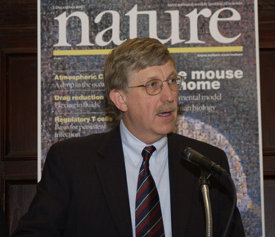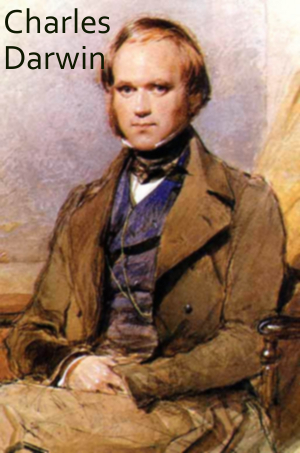At Least You've Got Thumbs
Body
Discussion
"Our supposedly eminent Bible scholars are now going on record to say that we must subordinate the authority of Scripture to the higher and more objective standard of secular science."
Body
Discussion
Francis Collins - No Friend of Bible Believers
 Francis Collins, the former Director of the Human Genome Project (HGP) and now the Director of the National Institutes of Health (NIH), has risen to national prominence in recent years. His scientific acumen combined with his rather public confession of Christian faith has garnered both excitement by Christians, as seen in these Christianity Today articles (here and here), and interest among unbelievers, as in this exchange with Richard Dawkins in Time.
Francis Collins, the former Director of the Human Genome Project (HGP) and now the Director of the National Institutes of Health (NIH), has risen to national prominence in recent years. His scientific acumen combined with his rather public confession of Christian faith has garnered both excitement by Christians, as seen in these Christianity Today articles (here and here), and interest among unbelievers, as in this exchange with Richard Dawkins in Time.
But not everyone is excited about Collins’ recent appointment by President Obama to direct NIH. Sam Harris, the author of the atheistic diatribes against faith, The End of Faith and Letter to a Christian Nation, questions Collins’ fitness for NIH due to the geneticist’s Christian faith in this NY Times piece. While I don’t question Collins’ fitness for his present position, I do question how much he should be viewed as an ally of Bible-believing Christians. His foreword in a new book exposes his disdain for anyone who would take the creation account in Genesis 1-2 as an accurate description of the beginning of the world. Collins pens a four-page foreword for Karl Giberson’s Saving Darwin: How to Be a Christian and Believe in Evolution (Harper One, 2008). In this rather strained attempt to harmonize Christianity and Darwinism, Giberson stretches the limits of reason and logic in an attempt to reconcile the irreconcilable. His book is introduced by Collins’ similarly tortured attempt to elevate science way beyond its boundaries and to denigrate anyone who supports Intelligent Design (ID), young-earth creationism or virtually anything regarding the early chapters of Genesis.
Collins describes ID’s challenge to evolution’s ability to explain irreducibly complex structures in living organisms as pressing on “despite the lack of any meaningful support in the scientific community” (p. v). This statement is simply not true and masks not only the many scientists who question Darwinism’s explanation of irreducible complexity but also the almost universal pressure on scientists to toe the party line concerning Darwinism.
Discussion
Who Is Our "Intelligent Designer?" Part 13 (Conclusion)

This is the 13th and final installment of this series. See parts 1, 2, 3, 4, 5, 6, 7, 8, 9 & 10, and 11 & 12.
After his ministry in Athens, Paul journeyed west and south to Corinth, where he spent 18 months (Acts 18:1-11). Notoriously immoral, this city was also obsessed with the “wisdom” of the Greeks, though the Athenians would probably have viewed them as being on a lower level than themselves in this respect.
Now let us see Paul’s strategy in reaching people for Christ in this city. Did he confront the Corinthians with spectacular and undeniable “design” arguments to win them to the Savior? No.
And I, brethren, when I came to you, came not with excellency of speech or of wisdom, declaring unto you the testimony of God. For I determined not to know any thing among you, save Jesus Christ, and Him crucified. And I was with you in weakness, and in fear, and in much trembling. And my speech and my preaching was not with enticing words of man’s wisdom, but in demonstration of the Spirit and of power: That your faith should not stand in the wisdom of men, but in the power of God (1 Cor. 2:1-5, KJV).
Discussion
Charles Darwin, Racist
Editor’s Note: This article is reprinted with permission from Doug Kutilek’s free newsletter “As I See It,” a monthly electronic magazine, and appears here with some editing. AISI is sent free to all who request it by writing to the editor at dkutilek@juno.com.

Lastly, I could show fight [vigorously advocate] on natural selection having done and doing more for the progress of civilisation than you seem inclined to admit. Remember what risk the nations of Europe ran, not so many centuries ago, of being overwhelmed by the Turks, and how ridiculous such an idea now is! The more civilized so-called Caucasian races have beaten the Turkish hollow in the struggle for existence. Looking to the world at no very distant date, what an endless number of the lower races will have been eliminated by the higher civilised races throughout the world.
—Charles Darwin (Darwin, Francis. The Life of Charles Darwin. 1902. Ed. John Murray. London: Senate, 1995., p. 64).
The volume from which this quotation is taken is essentially an abridgment by the author (one of Darwin’s sons) of his own longer 2-volume work (which contained considerable autobiographical material by Charles Darwin). It is not a hostile, fault-finding attack on Darwin, or a “Mommy Dearest” exposé by an alienated child, but a strongly pro-Darwin account. Its casual revealing of Darwin’s inner thoughts and attitudes regarding the races of mankind is therefore most telling.
“Natural selection”—the death and genetic elimination and extermination of “inferior” individuals and races in the mad scramble for survival—is viewed by Darwin, the founder and proponent of this view, as a great good, not merely among fishes and ferns and ferrets, but among people. Naturally, and arrogantly, assuming the superiority of his own “Caucasian” race (and of course himself, especially), he views with mirth the absurdity of the fear the white Europeans had in the 15th century of being overwhelmed by the Muslim Turks, which he viewed as a decidedly inferior race of people. And notice, it was not merely white hegemony that Darwin gloried in, but victory in “the struggle for existence” (emphasis added).
Discussion
An Apologia for the 24-Hour Day Creation View, Part 2
 Read Part 1
Read Part 1
Discussion
An Apologia for the 24-Hour Day Creation View, Part 1
 Because the tradition of Christian orthodoxy has a legacy of interpreting Genesis as a historic narrative, the prevailing interpretation of Genesis 1:1-2:3 has been that it is a record of God’s creative activity in six, consecutive, literal days followed by a literal seventh day of rest.
Because the tradition of Christian orthodoxy has a legacy of interpreting Genesis as a historic narrative, the prevailing interpretation of Genesis 1:1-2:3 has been that it is a record of God’s creative activity in six, consecutive, literal days followed by a literal seventh day of rest.

Discussion